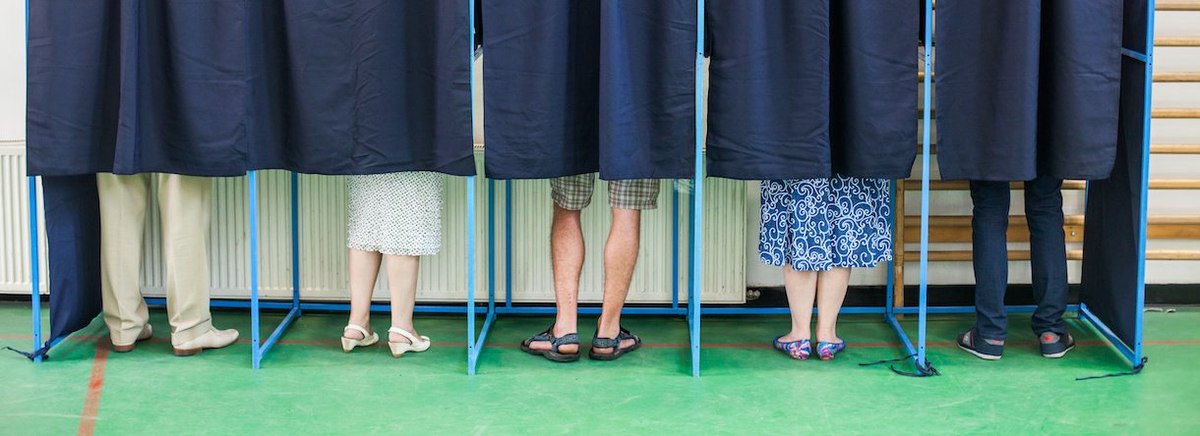Beliefs about electoral legitimacy and voter fraud rose to national prominence after the 2020 presidential election. Voters' confidence that votes were counted properly — often referred to as voter confidence — was particularly low among supporters of former President Donald Trump and decreased sharply after the election. To track these views in 2022, YouGov asked Americans about their confidence in vote counting and beliefs about voter fraud before and after the 2022 congressional election.
A considerable proportion of likely voters — registered voters who said they would “probably or “definitely” vote — and those who voted in 2022 lacked confidence in vote counting. Before the election, a greater share of likely voters were “very” or “somewhat” confident that their vote would be counted properly (83%) than thought the same about votes nationwide (68%). Similarly, only 14% of likely voters were “not too confident” or “not confident at all” that their vote would be counted correctly, while 29% said the same for votes nationwide. Likely voters’ pre-election confidence in vote counting in their county (82%) and state (79%) were similar to their confidence in the counting of their own vote.
Voter confidence did not change significantly after the election. Americans who voted in the 2022 congressional election remained more likely to believe that their vote was counted correctly than thought the same about votes nationwide. Compared to likely voters before the election, similar shares of voters after the election were very or somewhat confident about vote counting at the personal, county, state, and national levels — based on surveys conducted both several days and one month after the election.
However, the share of Americans who were very confident about vote counting increased at all levels after the election. While 30% of likely voters were very confident about vote counting nationally before the election, 42% and 43% of 2022 voters said the same in the days following the election and one month after the election, respectively.
Similar to previous election years, there were substantial differences in confidence between Democrats and Republicans, both before and after the election. Before the election, twice as many Democratic as Republican likely voters were very confident that their vote would be counted correctly (68% vs. 35%). Differences were even greater at the national level, with 49% of Democratic likely voters but only 12% of Republicans very confident in vote counting. Voter confidence among Independent likely voters was generally slightly greater than — or indistinguishable from — confidence among Republicans.
Unlike after the 2020 election, voter confidence after the 2022 election increased for both Democratic and Republican voters. Compared to likely voters' confidence in vote counting before the election, one month after the election, voters’ confidence that their own vote was counted was 8 percentage points higher among Democratic voters and 12 percentage points higher among Republicans. At the national level, those increases were 23 and 7 percentage points, respectively. Increases in confidence at the county and state levels were similar to those at the personal level for both Democratic and Republican voters.
In the days following the 2022 congressional election – when voters’ experiences at the ballot box are freshest in their minds – YouGov asked Americans about their views on illicit election activities. A sizable proportion of Americans believe that various forms of voter fraud and illegal election practices occur in their communities and nationwide. For example, 33% believe that voting machines record votes incorrectly in their local county “often” or “sometimes.” Similar proportions think that voters cast more than one ballot (29%) or use a false identity to vote illegally (33%) often or “sometimes” in their local county. Between 13% and 27% of Americans believe each policy YouGov asked about never occurs.
Americans are more likely to believe that these and other fraudulent election activities occur nationwide than in their county. While 28% believe that election workers tamper with ballots often or sometimes in their county, 36% think the same nationwide. There are similar differences for other activities, including voting with a false identity (33% vs. 42%) and voters casting multiple ballots (29% vs. 40%).
Republicans are more likely than Democrats to believe that most activities we asked about happen often. For example, in the days following the 2022 election, 15% of Republicans believed that voting machines recorded votes incorrectly in their county, while 9% of Democrats thought the same. Partisan differences are more pronounced for belief in voters casting multiple ballots (15% vs. 4%). However, Democrats (10%) are slightly more likely than Republicans (7%) to believe that eligible voters are denied the opportunity to vote by election workers in their local county. The beliefs of Independents generally fall between those of Democrats and Republicans.
Partisan differences are even greater for belief in voter fraud at the national level. While Democrats are similarly likely to believe fraudulent voting occurred in their county and at the national level, Republicans are far more likely to believe they occurred nationally. For example, while 14% of Republicans believe people in their county often use a false identity to vote illegally, 24% believe this often occurs nationwide. Conversely, Democrats are approximately just as likely to think this happens locally (8%) as nationally (6%).
— Carl Bialik, Taylor Orth, and Linley Sanders contributed to this article.
See the results of these polls:
Methodology: The article includes results from three separate surveys conducted on October 28 - 31 (1,000 U.S. adult citizens), November 9 - 11, 2022 (1,500 U.S. adult citizens), and December 7 - 11, 2022 (1,000 U.S. adult citizens). Respondents were selected from YouGov’s opt-in panel using sample matching. A random sample (stratified by gender, age, race, education, geographic region, and voter registration) was selected from the 2019 American Community Survey. The sample was weighted according to gender, age, race, education, 2020 election turnout and presidential vote, baseline party identification, and current voter registration status. Demographic weighting targets come from the 2019 American Community Survey. Baseline party identification is the respondent’s most recent answer given prior to March 15, 2022, and is weighted to the estimated distribution at that time (33% Democratic, 28% Republican). The margin of error for the overall sample ranges from 2 - 4%.
Image: Adobe Stock (bizoo_n)










